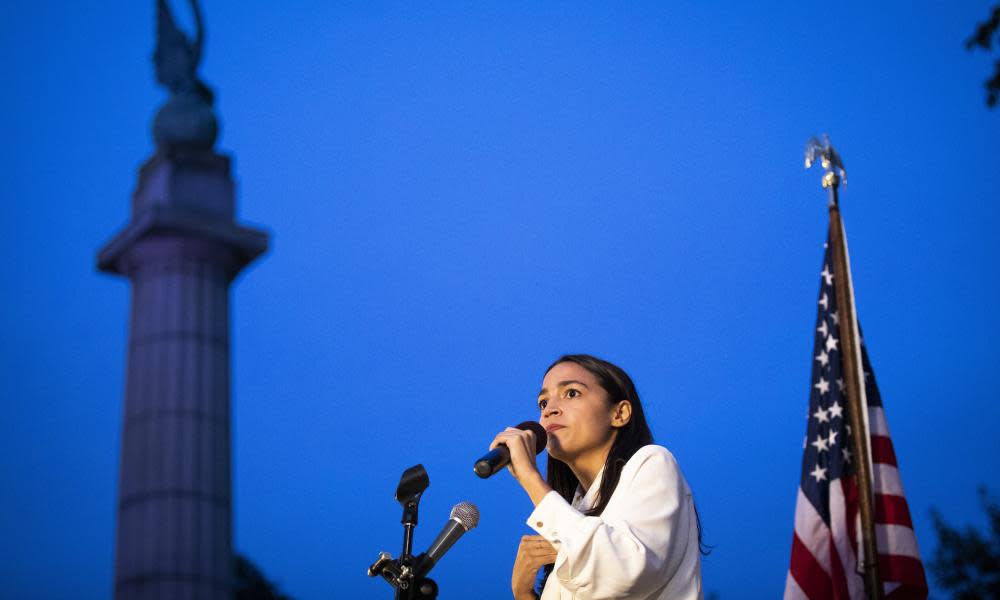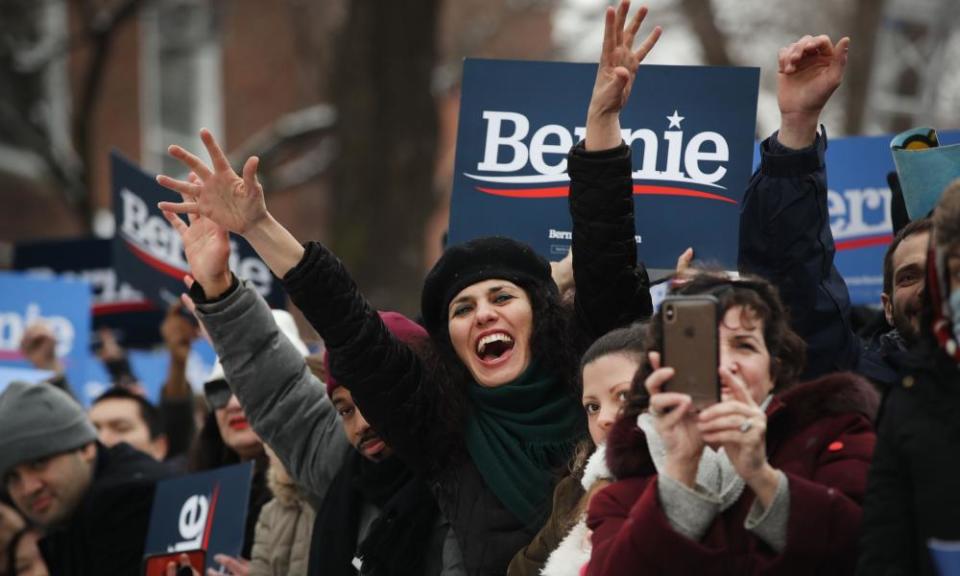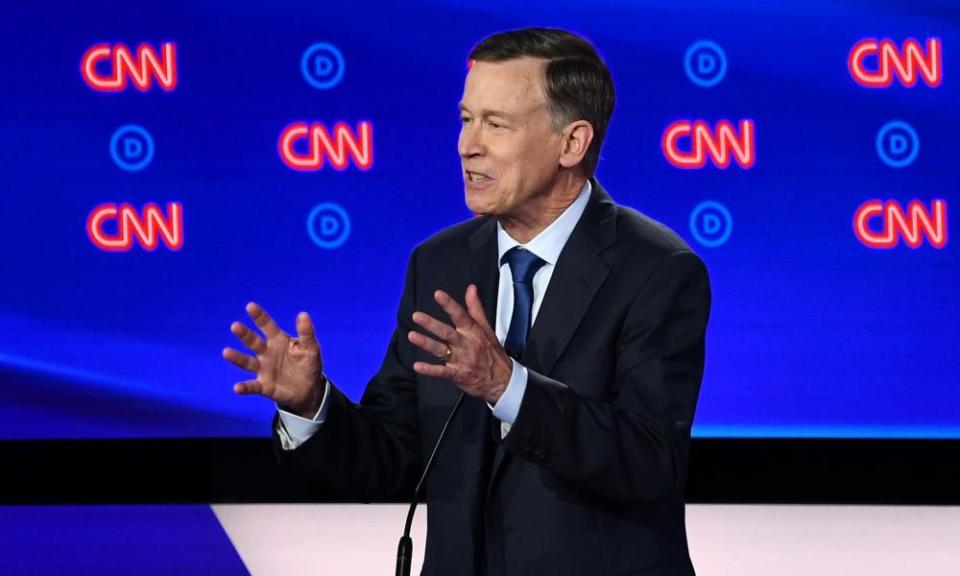‘We’re here to win’: US democratic socialists move to center stage

The last time the nation’s largest socialist organization came together for its biennial conference, congresswoman Alexandria Ocasio-Cortez was serving tacos and cocktails at a bar in Manhattan.
Two years later, the Democratic Socialists of America have doubled in size and the young, Latina, democratic socialist from the Bronx who unseated a 10-term veteran to win her New York congressional seat has become a political force so visible she is known simply by her initials, AOC.
Nearly 100 democratic socialists now hold elected office across the country, from school boards to state legislatures and Congress, where Ocasio-Cortez and the Michigan congresswoman Rashida Tlaib have become avatars of an emboldened leftwing insurgency. The Vermont senator Bernie Sanders, whose popularity has helped soften public perception of socialism though he is not directly involved with DSA , is a top-tier candidate for the 2020 Democratic nomination while Donald Trump is running for re-election on campaign slogans portraying socialism as a direct threat to America.
The DSA, founded in 1982, has never had more of a national presence in US politics. Now, as socialism moves from the margins of American political life to the center of presidential politics, the movement faces a new and welcome challenge: where to go from here?
“We’re not interested in losing and we’re not interested in performing our politics,” Maria Svart, DSA’s national director told the more than 1,000 democratic socialists who gathered in Atlanta last week for DSA’s largest-ever conference. “We’re here to win. And at a grand scale we want to transform society.”
Over the course of four days, in a conference room at the Westin Peachtree Plaza, a unionized hotel in downtown Atlanta, members, ecstatic over their growing ranks and electoral victories, envisioned a society untethered from traditional capitalism. But more immediately, they debated strategy and structure. The divisions over how DSA can best capitalize on a surge of interest echoed the central debate over the future of the Democratic party pitting pragmatism against ideological purity.
“Right now so much is possible and it’s incredibly exciting,” said David Duhalde, the former deputy director of DSA who recently worked for the Sanders-aligned, Our Revolution. “But that also begets many, many more debates and questions about how we move forward and that is a great problem to have.”

In a series of votes, members approved measures to prioritize electing democratic socialists at every level of government and to grow membership, currently at 56,000, to 100,000 while rejecting a proposal to adopt national political “litmus tests” for candidates. They will continue to run primary challenges against centrist Democrats and to organize low-income, working people, including in communities that voted for Trump.
Amid much debate, DSA, which enthusiastically backed Sanders earlier this year, passed a resolution titled “In the event of a Sanders loss,” stipulating that the group would not formally endorse another Democratic presidential nominee if the Vermont senator does not win the primary.
Members also voted to support the Green New Deal, universal childcare, the decriminalization of sex work and “open borders” – a radical idea that goes far beyond what any Democratic presidential candidate would endorse. They also reaffirmed their support for the controversial Boycott, Divestment, Sanctions movement to protest against Israel’s treatment of Palestine and narrowly voted to establish an “anti-fascist working group”.
But even for veterans, the hours-long debate – frequently interrupted by arcane procedural inquiries strictly governed by Robert’s Rules of Order – was a slog. Efforts to keep the discussion “comradely” by stifling side chatter and using gender-neutral terms drew snickers from conservative media.
At one point during a back and forth over whether to expand the organization’s national staff, an irritated delegate stepped to the microphone to raise a point of order.
“Can we please use ‘comrade’ as an honorific instead of ‘sir’ or ‘madam’?” the delegate asked tersely. The chair quickly apologized and thanked the “comrade” for raising the point.
DSA’s numbers are relatively small, but its outsized impact on the conversation has caused a political headache for mainstream Democrats who reject any association with socialism.
During the presidential debate in Detroit, centrist John Hickenlooper, the former governor of Colorado, said Sanders’ policies, including Medicare for All and a Green New Deal would be a “disaster at the ballot box”.
“You might as well FedEx the election to Donald Trump,” he said.

Not far from the Westin, where DSA members made plans to grow their ranks, Vice-President Mike Pence implored conservative youth to resist the “siren song of socialism”.
“It’s not going to be enough just to win the next election,” he said at the Resurgent Gathering in Atlanta on Friday. “We got to win the next generation. We got to go tell the story to younger Americans about the truth – the truth about socialist policies.”
But a May Gallup poll found an increasing number of Americans – four in 10 – believe some form of socialism would be good for the country, though more than half still disagree.
At rallies and on social media, Trump has sought to portray all his Democrat adversaries as socialists intent on bringing “unAmerican”, European-style welfare programs across the Atlantic. These ideological attacks, which he has paired with racist and anti-immigrant rhetoric, are part of a political strategy to galvanize his core followers.
“Trump is attacking us because the socialist movement offers an alternative vision to what he is offering, which is essentially neo-fascism,” said Svart, DSA’s national director. “He is threatened by us. And so are the Wall Street Democrats.”
She continued: “What we’re saying as democratic socialists is that none of it has to be this way.”
Most new DSA members are young, millennials who came of age during the global financial crisis, like Rachel Kahn. But the group’s numbers didn’t start to rise until Sanders ran for president in 2016.
“He was the person who made me realize that I’m a socialist,” Kahn, 29, said on a break during the conference.
Polling suggest that young people are increasingly disillusioned by capitalism and more open to socialism than previous generations. At the same time, young people are more likely to associate socialism with the Scandinavian-style social welfare state than with Soviet communism.
Though it was her first time attending a DSA conference since she joined a local Atlanta chapter, Kahn spoke passionately on several resolutions, particularly those she thought might affect candidates in the south.
On a question about litmus tests, she said forcing southern candidates to identify as “democratic socialists” would be a “death sentence”. The resolution failed.
“People here are so institutionally primed to have a visceral, negative reaction to socialism,” she said. “If we want to win here,” she said afterward, “that might require molding ourselves to our environment a little bit and leading with our values instead.”
khalid kamau, a member of the city council in South Fulton, Georgia, and first #BlackLivesMatter organizer elected to public office, told the conference: “We have to understand that us fringe people are future thinkers.”
At a press conference later that weekend, he joined nearly two dozen locally elected democratic socialists, including from traditionally Republican areas. The slate included Ruth Buffalo, a Native American representative in North Dakota who ousted the sponsor of the state’s ID law, Mik Pappas, a district judge in Pennsylvania who has sought to end cash bail in his court, and a contingent of the six democratic socialists recently elected to Chicago’s 50-member city council.
“It’s a recognition that capitalism has failed us,” Gabriel Acevero, who was elected to the Maryland state house of delegates in 2018, said of their growing ranks in elected office. “Capitalism has failed working people. Capitalism has failed oppressed people and capitalism has failed our planet. And I think more and more people are coming to that realization.”
Near the end of a long day of debate, cheers rang out in the conference room. Sean Parker, a democratic socialist in Nashville, had just won a seat on the city council.

